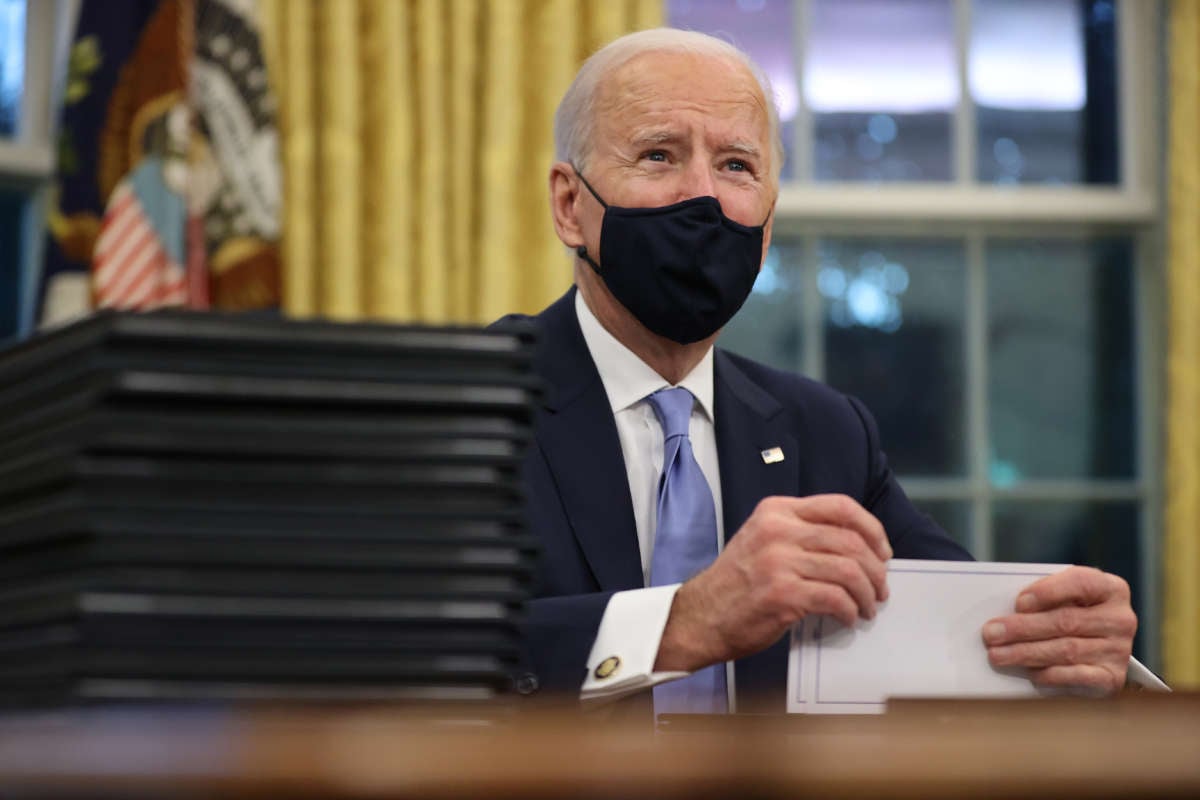Did you know that Truthout is a nonprofit and independently funded by readers like you? If you value what we do, please support our work with a donation.
As President Joe Biden begins rolling out executive orders and legislative proposals aimed at reshaping federal government priorities, when it comes to labor issues, his $15 federal minimum wage proposal, which would increase the minimum wage nationally to this level within four years, has received the lion’s share of attention.
Congressional Budget Office (CBO) analysts estimate that it would bring roughly 1.3 million workers — people, living in states (mainly in the South and rural mid- and-mountain West) without their own higher-than-the-federally mandated minimum wage — above the poverty line; but the CBO analysts also fear it would cost the U.S. economy a roughly similar number of jobs.
This is the fault-line on which Biden’s first major legislative labor proposal will be debated. Incoming Treasury Secretary Janet Yellen, as well as a raft of progressive economists and think tanks, argue the CBO is significantly overestimating the negative impact on the job market. Unions are lobbying hard for the measure; immigrants’ rights groups — who represent low-wage workers in industries such as domestic work,care-giving, and cleaning services — support the change. But Republicans and industry groups will certainly fight hard to prevent its implementation.
That Biden has, out of the starting gate, pushed for a doubling of the federal minimum wage speaks to a stark shift in how the federal government will be approaching labor issues — from wages to workplace safety, from the right to organize to the right to paid family leave — under the new administration. Yet, while the minimum wage is a huge part of this conversation, it is, in reality, by no means the only issue of importance. In fact, many of Biden’s other plans, if fully implemented, will impact more people than will a minimum wage hike — this is because so many states have already jumped ahead of the federal government by setting in motion their own wage increases over the next several years that at this point, the feds are simply playing catch-up on this particular issue.
At least as important as the minimum wage is the broader context of worker rights. For four years, Trump’s people have taken gratuitous swipes at workers. They made it easier for employers to discriminate against employees, using religion as an excuse; made it harder for millions of workers to claim overtime pay; put in place a series of executive orders and regulatory changes designed to massively corrode the protections afforded unionized federal employees; and took a sledgehammer to what remained of the right to organize into trade unions.
It’s not a stretch to say that under Labor Secretary Eugene Scalia, the Labor Department became little more than a vehicle for attacking workers’ rights.
In nominating Boston Mayor Marty Walsh, who was previously an official with the Boston Building Trades Council, as his labor secretary — the first time a union leader has occupied the role in more than forty years — and in talking about workplace issues in the weeks since the November 3 election, Biden signified that he was embracing a 180-degree turn away from Trump’s labor priorities. He embraced strong equal pay and anti-age discrimination protections, came out in support of paid family leave for workers, indicated he wanted to expand access to subsidized child care services, and promised he would sign a Protect the Right to Organize Act, which would make it easier for unions to gain a toehold in workplaces.
Now it is, of course, one thing to talk the talk on all of this and another to be able to walk the walk. Or, to put another way, for Biden the proof will be in the pudding in the coming years. He has ambitions to be the most pro-worker president arguably since FDR and the New Deal. But can he convert good intentions into political reality?
If his first few days on the job are an indication of things to come, President Biden is putting a huge amount of his political capital into this effort.
Within hours of being sworn in, the U.S.’s 46th president had moved to start implementing these new priorities. On the afternoon of Inauguration Day, he signed an executive order ramping up workplace safety rules and using Occupational Safety and Health Administration (OSHA) authorities to ensure employers are putting in place safety protocols to protect workers from the risk of catching COVID-19 while on the job. He nominated a United Steelworkers safety expert, James Frederick, to head OSHA; on Friday, he rolled out. At the same time, he fired two Trump appointees from the National Labor Relations Board after they refused to resign.
It’s early still, certainly too early for pro-labor organizers to run victory laps. But the signs are there that, as he works to stabilize an economy and polity fractured by rancor and, more recently, by a public health calamity, Biden is set on re-empowering workers and trade unions in a way that hasn’t been attempted in this country for decades. Indeed, if his more ambitious plans reach fruition, it might well be the biggest sea change in how the economy functions since the New Deal of the 1930s. After a half-century of growing inequality, workers’ rights might once more be on the political front-burner. It is a truly tantalizing prospect.
Speaking against the authoritarian crackdown
In the midst of a nationwide attack on civil liberties, Truthout urgently needs your help.
Journalism is a critical tool in the fight against Trump and his extremist agenda. The right wing knows this — that’s why they’ve taken over many legacy media publications.
But we won’t let truth be replaced by propaganda. As the Trump administration works to silence dissent, please support nonprofit independent journalism. Truthout is almost entirely funded by individual giving, so a one-time or monthly donation goes a long way. Click below to sustain our work.
